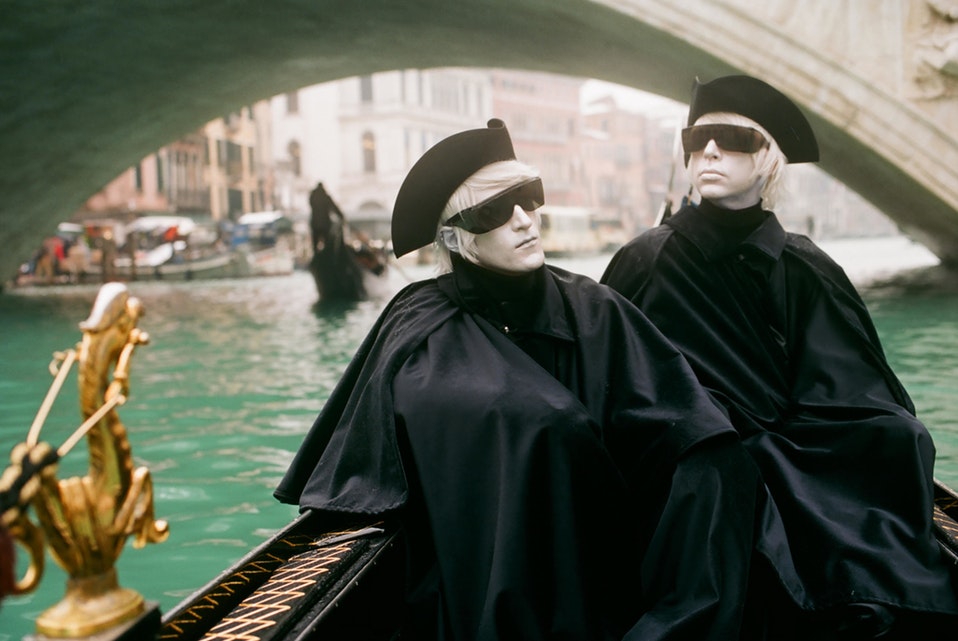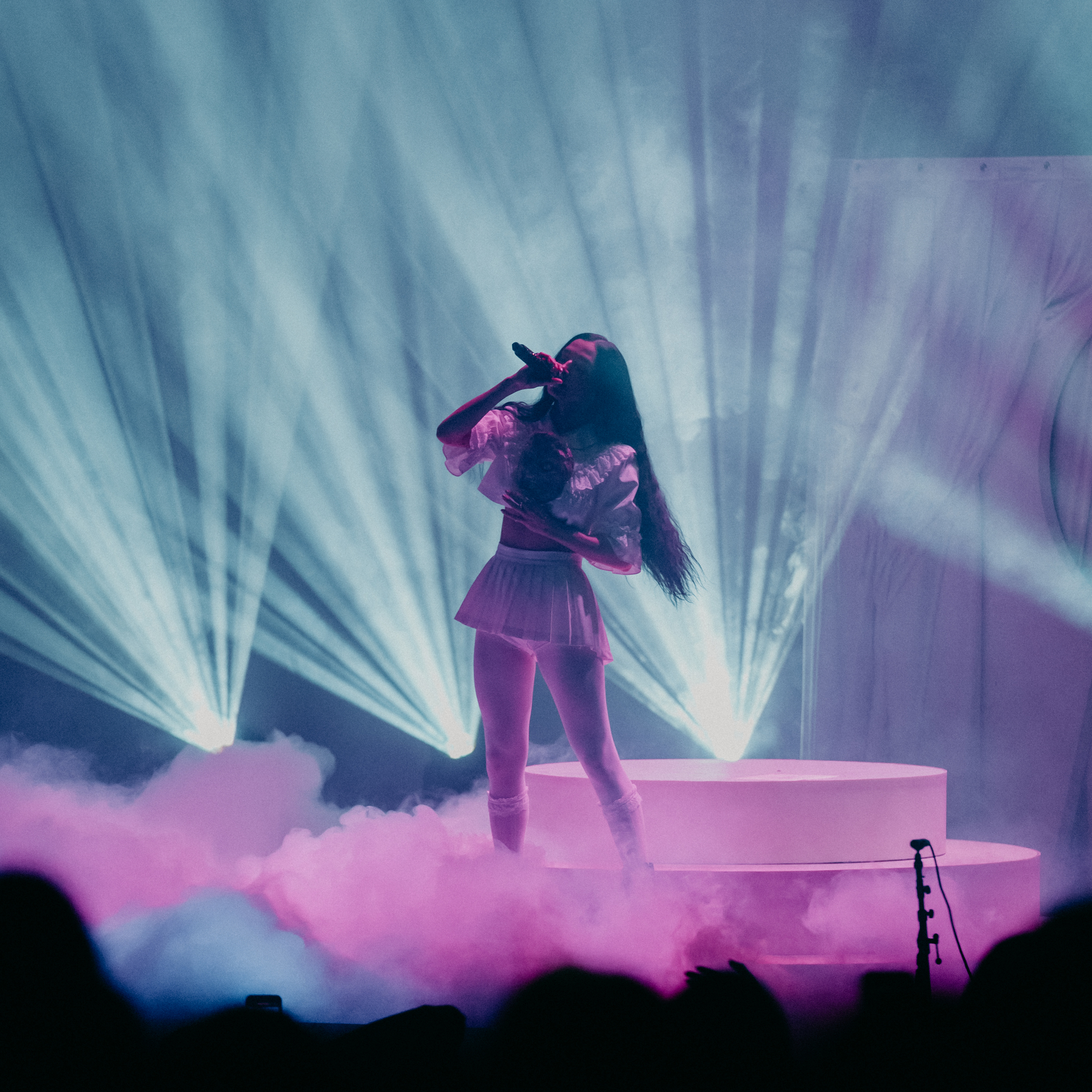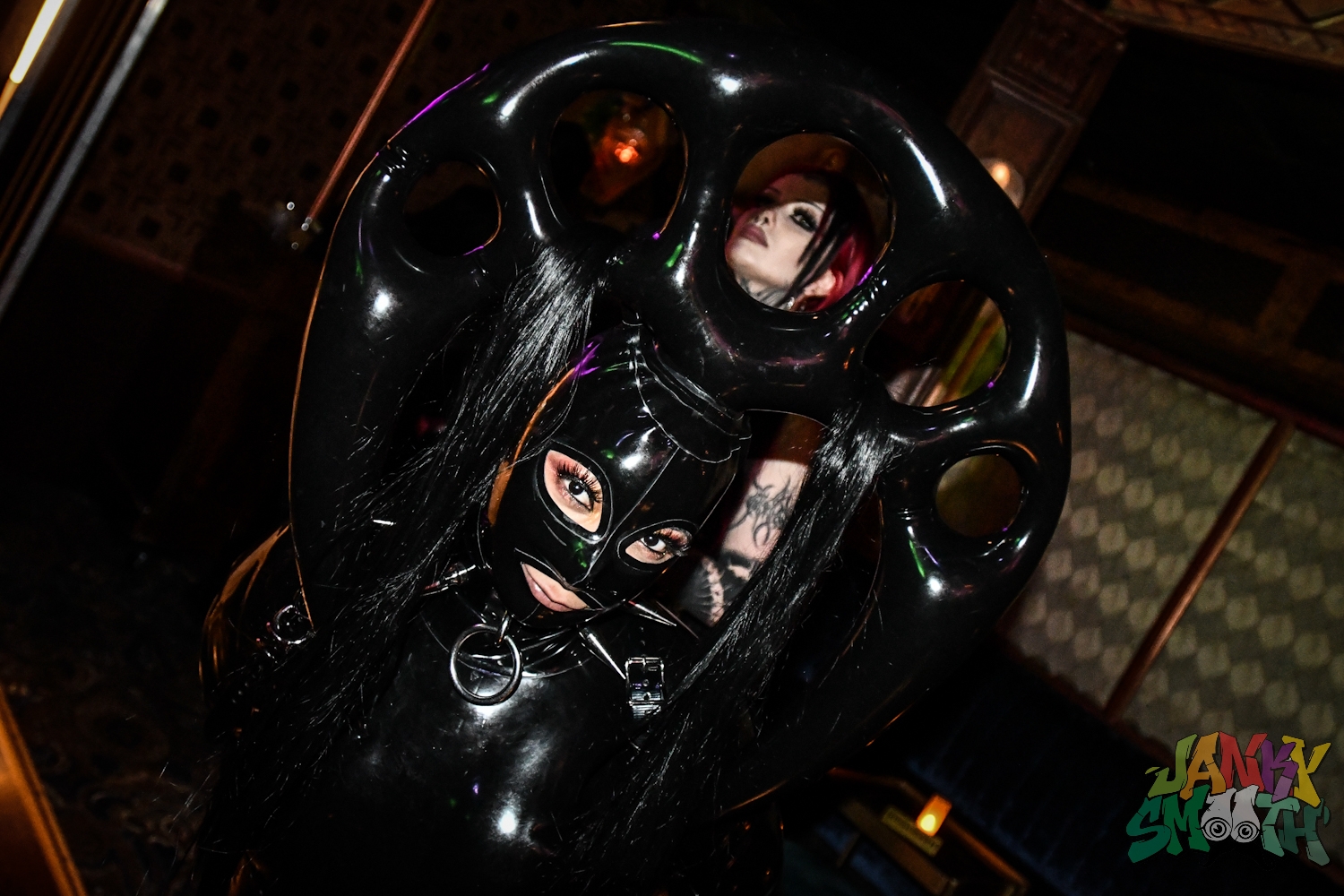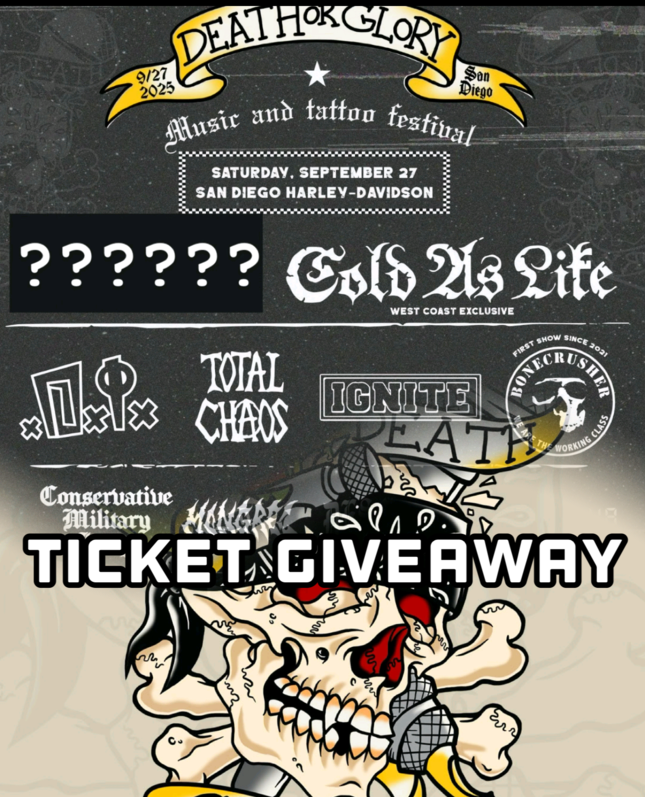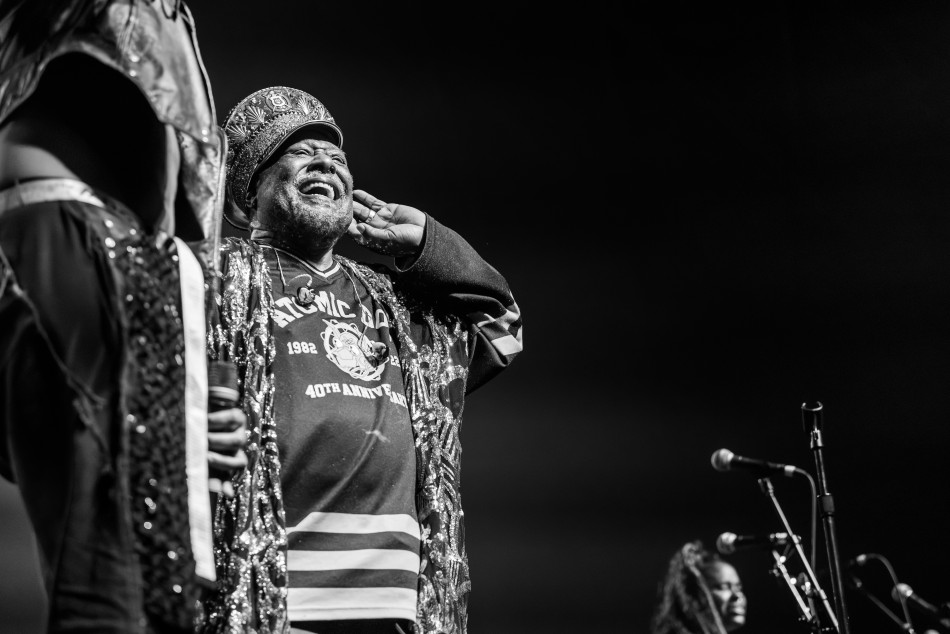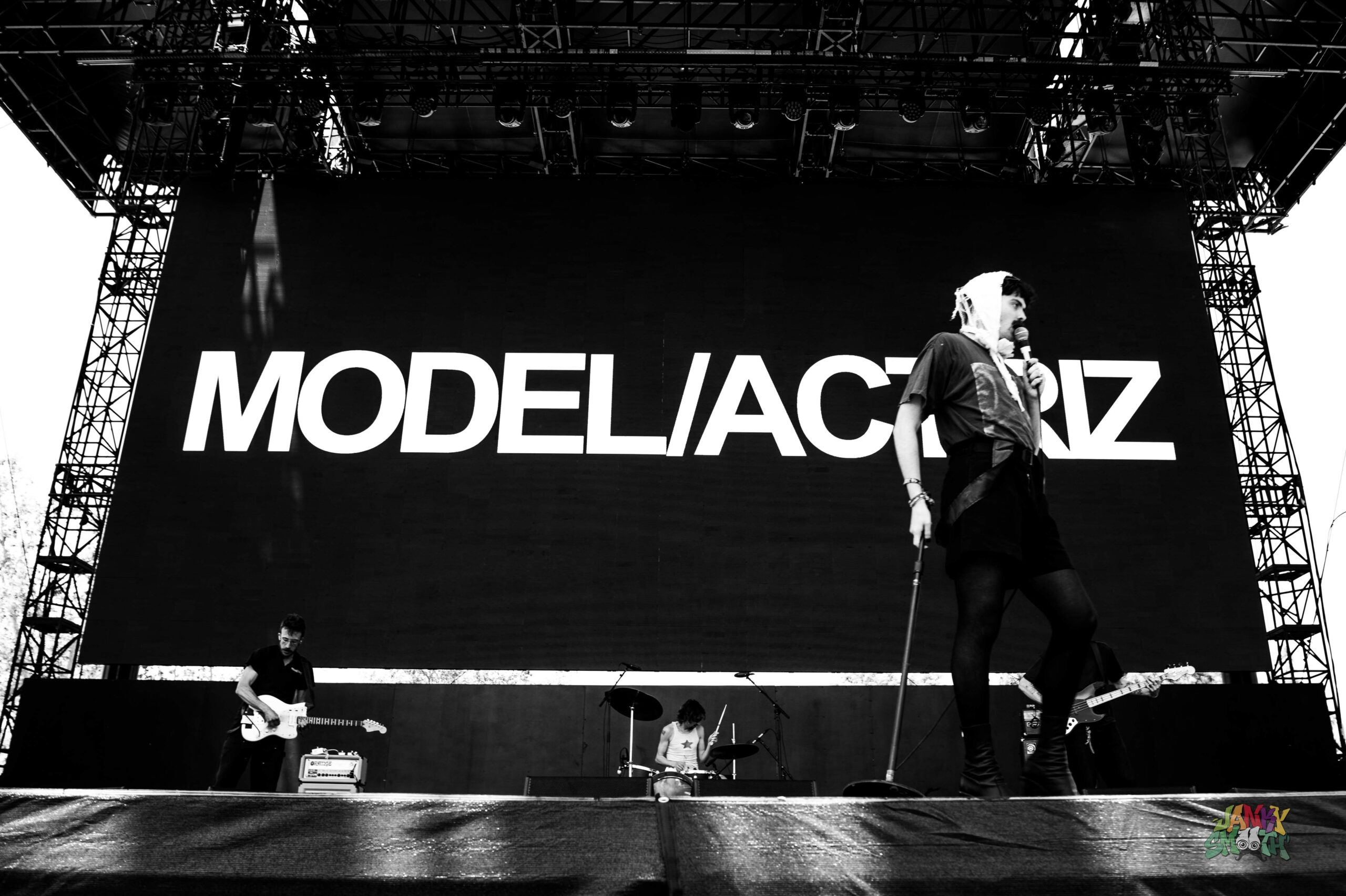David Hume once said, “Beauty is no quality in things themselves: it exists merely in the mind which contemplates them.” For Deb Demure, founder of the impeccably designed duo Drab Majesty, beauty exists primarily in the complicated, nuanced and precious relationships between individuals. On the first night of their North American tour, Deb took some time to muse about the individuals whose beauty he and Mona D. channeled into their third full-length album, Modern Mirror, which was released on Dais records on July 12, and some will surely come as a surprise, whether it be the unrequited love between Echo and Narcissus, their community of unfaltering friends and fans, or even Deb’s influentially bodacious grandmother.
Audrey:
It’s July 24th. You’re kick-starting your North American tour tonight in San Diego and you’ve just found out your third full-length album, Modern Mirror, is currently ranking number 6 on Billboard. How does it feel?
Deb:
In theory, it’s cool. Has my life been drastically changed? Probably not. I’ve never really been one to look at the Billboards or anything like that. I know, I kind of live under a rock, but I understand historically what that means. For me, reception is important on an emotional level but as far as stats and numbers go, that stuff is cool to me, but it’s also incalculable. I can’t really quantify it in my mind. I guess it’s good. I’m happy that it’s a step up from the last record; there has definitely been growth so I am happy with growth, but as far as it being on Billboard, or what that means, I guess it’s cool.
Audrey:
Personally, I was really glad to see that it has been received well, as I was a big fan of it, especially because although it’s your newest album, Modern Mirror re-introduces some ancient figures from Ovid’s Metamorphoses, specifically Narcissus and Echo, so I was wondering, what is it about modern times that makes Narcissus and Echo relevant once again?
Deb:
Mythology always has a present-day application. These are archetypes that have repeated themselves through history and throughout the years. I like the character of Narcissus because of the the full rejection of something that is tactile and on this Earth, a living, breathing person who is in love with him, and rejection of that for something that is intangible, for something on the screen—the water on the screen. I kind of like that analogy, whether it’s obscure for some or if it’s totally bland and obvious to others. For me, I like that, I like how it plays out and I think it has relevance.
Audrey:
From a listener’s perspective, the third track, “Ellipsis” seems like a meditation on the anxieties surrounding modern communication. So, what themes came through the most during the process of creating this album in general?
Deb:
If you bring up “Ellipsis,” the phenomenon of the three dots is interesting to me because it’s an indicator that someone on the other line is essentially thinking, acting or responding, and the anxiety comes when seeing that symbol appear and that lag time. It’s like, where technology should be immediate, it should essentially be more convenient to convey a thought but rather, it becomes this way more anxiety-producing, disjointed interaction between people. That’s what is interesting about that character, because you see it as a thought that is being constructed, and it’s being edited and then it’s being sent back to you. Just imagine that process taking place in a real conversation. If you were to ask me something, I kind of sit there, look down, look side to side and I close my eyes, and I try to formulate my thing and then 40 seconds later, I just say “Okay.” You’d think, “What is wrong with you? What did you just do there in that time span?”
So it’s weird that screens have liberated us to rehearse and compose something that’s not our immediate response. I think that phenomenon is really interesting, so that’s essentially what that song is about. Although that song is speaking more broadly, the themes overall on the record tend to be somewhat personal. I’m not too keen on going song-by-song what everything is about. Some of the stuff is more personal but the lyrics are broad so I’m not speaking too specifically about an incident where it ostracizes someone from feeling like they are not of the song. It allows the ability to imbue into lyrics personal meaning. I try not to make it too out there. I like broader themes in my music, so that people can insert their own symbolism into it.
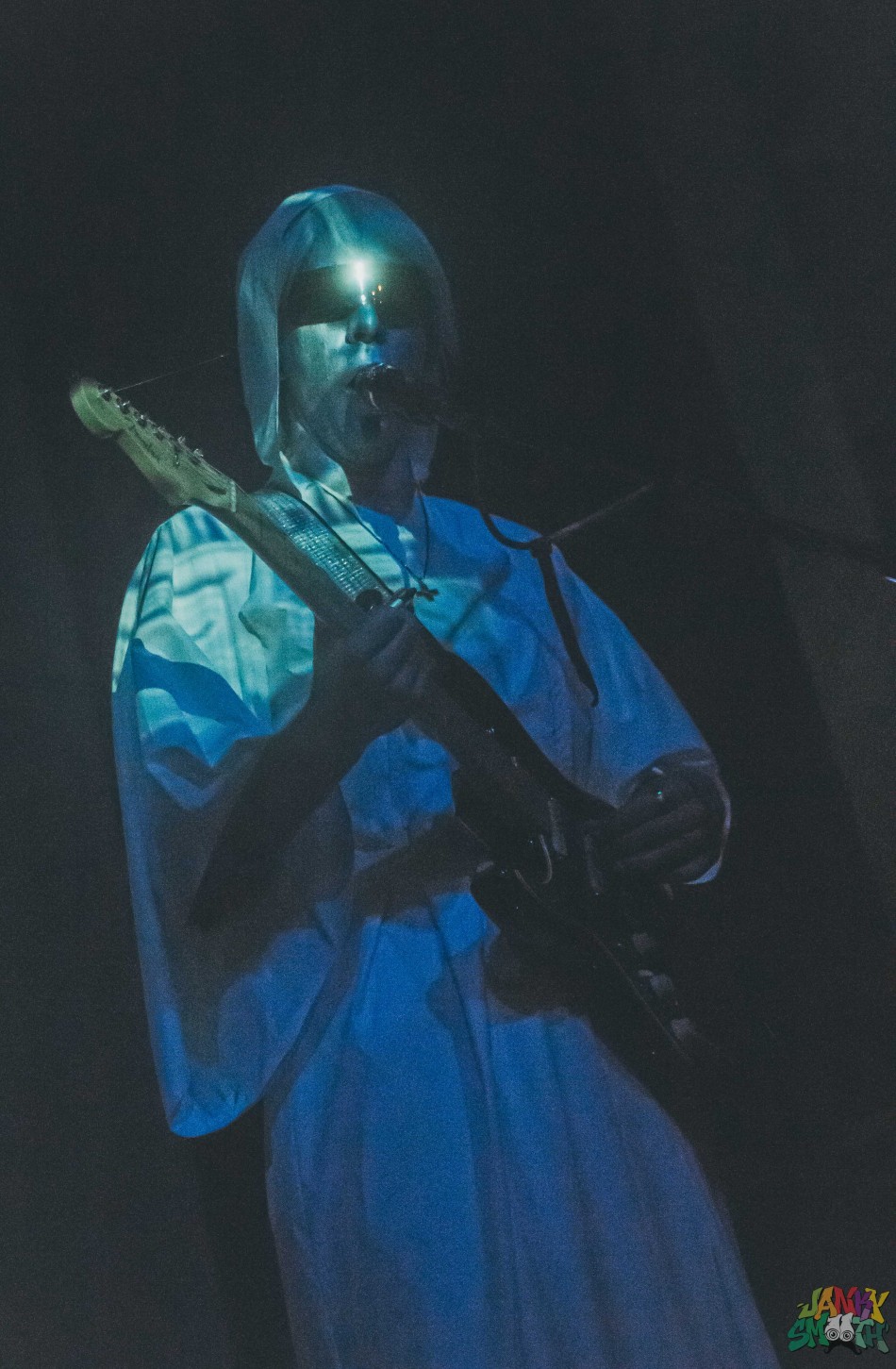
Audrey:
I enjoy that about your music, that interplay between the individual experience and the collective. Certainly, I can see that with “Oxytocin,” that being a chemical synapse in the brain we all experience. I wanted to talk briefly about that music video because it is just so beautiful. It almost looked Rococo in its aesthetic. I know that you come from a fine arts background and Mona a theatre background, so I wanted to ask you how your backgrounds manifested in your art.
Deb:
I went to school at Otis College Of Art and Design and I was fully focused on being a painter and then that quickly dissolved, and performance art became much more interesting to me—people like Joanna Went, Joan Jonas, Mike Kelley, eccentrics like that. I was really drawn toward those personas and how liberating embodying characters can be and Alex (Mona) is no stranger to embodying characters. He is a character actor, a fantastic actor. He can really embody a multitude of personalities at the snap of a finger. For us, that play of abandoning ourselves and moving into other characters is something that is pretty familiar. With Drab aesthetically, I took less cues from art school and more from my grandma in the beginning, actually. Growing up, she had a weird, decadent style that was a pastiche of a lot of things, some things Rococo, other things Greco-Roman, some really gaudy, grandma aesthetics, so somehow that’s where it started. Then, it just started shifting organically.
Audrey:
Indeed, the apple does not fall far from the tree. That makes me wonder about your new merch, the Chinoiserie fan and the retro tin compact. Are those pieces, in essence, paying homage to your grandmother?
Deb:
Absolutely, especially the fans. My grandmother had this one bathroom in her home. It was the weirdest pastiche of glitter-gold wallpaper juxtaposed by these red fans that were hung on the walls. Then, there was a little cheap, plastic Venetian gondolier that lit up on the marble countertop. There was also this Asian rug on the ground. The whole thing was just a hodgepodge of things she had accumulated in her travels as a young woman. My interest in fans I can definitely carbon date back to her and those rooms. The compact mirrors were always something I wanted to do, even well before the title of the record, Modern Mirror, was even a seedling of a thought. The compacts came out really cool and they totally look like something a grandma could possibly have in the arsenal or their pocket book.
Audrey:
Even that famous photo of you two riding down the Grand Canal has echoes of the gondolier in her powder room.
Deb:
Totally—amazing that you said that. I said that without even thinking of that. Well played.
Audrey:
Last thing I want to bring up about the merch: upon sifting through the comments, I noticed that Billy Corgan himself commented on the fans in traditional vampiric fashion, “I vant vone!” Tell us about your camaraderie with Billy Corgan, touring with the Smashing Pumpkins and cameoing in the “Silvery Sometimes (Ghosts)” music video!
Deb:
Yeah, Billy’s really cool. He’s a very nice dude. He’s very generous to bring us on tour. They definitely don’t need any openers so I think he is doing his due diligence of looking into the underground and seeing what’s going on and I appreciate that he paid attention. Essentially, I heard a fan asked Billy whether he had ever heard of us because they said he would like us. He said no, but for whatever reason, he thought this fan knew what they were talking about and he took them seriously. He discovered us super organically like that. I think it’s cool that he interfaces with his fans and does Q&As on Instagram where he’s taking music recs and whatnot. Essentially, we were a music recommendation, he took a screenshot of him listening to our song, someone saw it, I was notified and from thereon we just formed a cool dialogue. Of course, I’m a huge fan of the Smashing Pumpkins, very influenced since I was a wee boy, single digits.
Audrey:
I’m so glad you two have that relationship. It’s well-deserved, anyway. And it is cool that he has that internet relationship with his fans like you do with your elusive Facebook group, “The Silent Ones.”
Deb:
Yeah, that has been a really fun, interesting experiment, opening the doors for people to arrive at a place where they can congregate and share ticket stubs. It’s really moving and kind of surreal, to be honest. Honestly, I was resistant about having a group for a while, sort of like having a party for yourself, or so I thought. Then I realized that this is a cool way for people to come together, organize and make friends over this project that is so far out of our hands at this point and has become something unto itself. It is truly incredible to sift through the comments and see how people are making friends and describing their experience with this band. It’s awesome.
Audrey:
I know it becomes a bit of a repetitive topic for you guys, the whole goth scene, and how you’ve been compared to the bands you’ve played with, like Clan of Xymox. However, you’re making something new out of a scene that has stayed stagnant for the past thirty years. You’re bringing it into cyberspace and it’s very interesting.
Deb:
I appreciate the non-goth comparison. Hopefully we are ushering into a new era where people don’t take a look at us and and think of as these dark dudes. Sure, there’s darkness but there is also light. There’s an absolute balance that we try to strike. One is no better than the other, but I really hope going forward that becomes clear. Especially with this release, this album was constructed to function as a more summery and optimistic album. The conditions in which the songs were written were much more happy, less catharsis, more pure inspiration and more lust for life. At least, that was the driving impetus when it came to getting up and doing it. It’s a lighter record. It’s a happy record, I think.
Audrey:
It definitely translates that way. And as you embark on this North American tour with Body of Light, would you like to relay any final transmissions to your fans?
Deb:
If anything, just an incredibly immense, infinite thank you to everyone who has supported this record and cared about this band. We still are very much an underground band and will always be. We love our fans very much. It’s pretty cool to see weirdos like us on Billboard for sure, and that’s definitely because of our fans. Hopefully there’s some hope for future weirdos who want to take a risk and do something that’s not necessarily the same run-of-the-mill thing. Hopefully we can inspire and encourage everyone to explore whatever creativity that’s inside their hearts and needs to get out. That’s essentially what this project is: a totally underground grassroots band that’s just a couple of weirdos doing their thing. If you do it enough times and stick to it, there’s some light at the end of that weird phase.
Words by: Audrey Kemp


